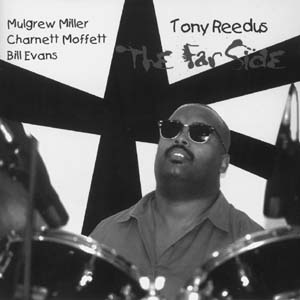Never Let Go
'The Far Side' shows the good side of jazz drummer Tony Reedus
By Nicky Baxter
IN THE WAKE of high-powered players like Tony Williams and Billy Cobham, few drummers have made an impression on die-hard jazz buffs and critics in recent years. Tony Reedus, however, has everyone talking. Reedus migrated to New York in the early 1980s and quickly established himself as a young master of the drum kit, working with trumpet ace Woody Shaw. He has since performed and recorded with Benny Golson and the Mercer Ellington Orchestra and issued several recordings as a soloist. The Far Side (Evidence) is the finest of the drummer's three albums as bandleader.
The album is kick-started by the title cut, a frenetic number spotlighting Reedus' aggressive yet controlled approach. The song also demonstrates his skills as a composer. The piece zigzags through a maze of devilishly tricky chord changes with Reedus leading the way. Alternating clicking high-hat work with turbulent slaps on the snare, he isn't content with mere timekeeping. Rather, Reedus pushes the pulse forward. It helps that the drummer has surrounded himself with a stellar cast: Mulgrew Miller on piano; Charnett Moffett on bass; and the incomparable Bill Evans sitting in on a handful of tracks on saxophone. Having shown his ability to play at hyperspeed, Reedus settles down for the ballad "Song of Gideon." Here his playing is admirably melodic. Quietly splashing cymbal work and relaxed drum fills parley with Moffett's always tasteful bass accompaniment. Miller's trilling piano interjections are modest, unobtrusive, playing off Evans' airy soprano saxophone.
What's remarkable about The Far Side is that although it was initially produced and released in Japan nearly a decade ago (the Evidence release marks its stateside debut), there's not a hint of cobwebs. The set's freshness is a welcome surprise, and the album offers a myriad of stylistic approaches, from the sumptuous romanticism of "Never Let Me Go" to the vivacious charm of "You and the Night and the Music" to the vaguely Latin feel of "Summer Night." These tracks are saxless, with Miller's capable piano assuming solo responsibilities. He acquits himself particularly well on the last tune, interspersing a taste of tropicalia with homegrown jazz-blues. His single-note runs are flawlessly executed, as are his orchestral chordal blocks.
Still, the session's finest moments come when Evans is part of the mix. On Michael Jackson's "I Can't Stop Loving You," Evans' playing nearly spells out the song's lyric. He carefully avoids the tedium of all too many smooth-jazz interpretations of pop songcraft, allowing himself ample room to explore the tune's improvisational possibilities. Though he doesn't shun its inherent "prettiness," Evans adds substance by infusing the performance, particularly his solo, with heartfelt passion. Prodded by Reedus' insistent, slashing stickwork, The Far Side never strays from the right side of genuine passion.
[ San Jose | Metroactive Central | Archives ]
![]()

Night and the Music: Tony Reedus drums up an impression on his new album.
From the June 11-17, 1998 issue of Metro.
![[Metroactive Music]](/music/gifs/music468.gif)